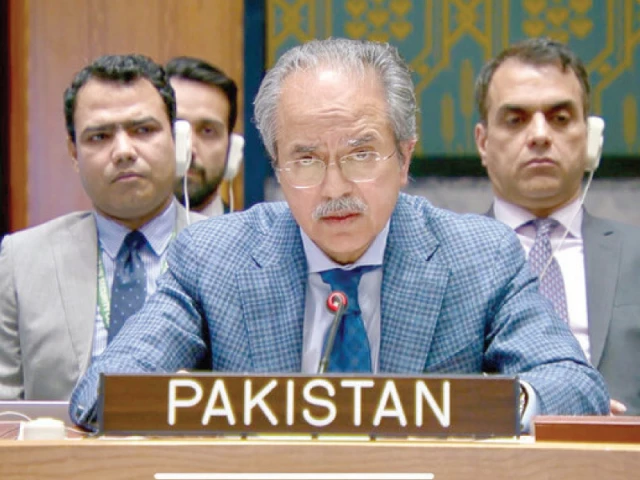Supports UN resolution to delist Syrian leaders, calls for stability and reconstruction
Permanent Representative of Pakistan to the UN Ambassador Asim Iftikhar Ahmad. photo: file
Pakistan has urged India to fully comply with the Indus Waters Treaty (IWT), warning that India’s unilateral suspension earlier this year represents a “deliberate weaponization of shared natural resources” that threatens ecosystems and the livelihoods of millions.
Ambassador Asim Iftikhar Ahmad, Pakistan’s Permanent Representative to the United Nations, made the remarks during a Security Council briefing on the environmental impact of armed conflict and climate-driven security risks.
“India’s illegal unilateral decision undermines the letter and spirit of the treaty, disrupts data sharing and endangers the lives of millions who depend on these waters for food and energy security,” Ahmad said. “Such actions not only harm one country, they undermine confidence in international water law and set a precedent for resource-based coercion elsewhere.”
Read: Here’s what India’s suspension of the Indus Waters Treaty means for Pakistan
He described India’s move as a breach of a treaty that has governed equitable water sharing between the two countries for more than six decades. The envoy recalled that the 1960 treaty brokered by the World Bank divides the six rivers of the Indus basin between India and Pakistan, giving Pakistan control over the western rivers and India over the eastern rivers.
Disputes over India’s hydropower projects on the western rivers have been a source of tension for years, culminating in arbitration at the Permanent Court of Arbitration (PCA) in The Hague. In 2025, the PCA confirmed the continued validity of the treaty and its dispute settlement mechanisms, ruling that no party can unilaterally suspend the agreement.
“No provision in the treaty allows for unilateral suspension or modification,” Ahmad stressed. “We therefore expect full respect for the treaty and an early return to compliance and normal operation through established channels.”
The ambassador also highlighted the link between environmental degradation and wider security challenges. Noting that armed conflict and climate-related stress, including rising sea levels, pose existential threats to vulnerable nations, he urged the Security Council to focus on early conflict prevention, integrate environmental considerations into peace operations, uphold international humanitarian law and ensure coordinated post-conflict ecological recovery.
Ahmad also called for new, predictable, grant-based climate and biodiversity funding. “Environmental damage in conflict is not just collateral – it can be a multiplier of insecurity,” he said, reiterating Pakistan’s commitment to international cooperation to transform shared natural resources into instruments of cooperation rather than conflict. He warned that such aid must not add to the debt burden or be double-counted with development aid or humanitarian aid.
Delisting of Syrian leaders from the UN Sanctions Committee
Pakistan has voted in favor of the UN Security Council resolution to remove Syrian President Ahmed al-Sharaa and Interior Minister Anas Khattab from the 1267 sanctions committee, describing the move as a step towards Syria’s political stability, institutional reconstruction and economic recovery.
Ambassador Asim Iftikhar Ahmad said the vote aims to enable Syria to pursue sustainable development after more than a decade of conflict and civil war, stressing that sanctions should be combined with sustained dialogue and a Syrian-led political process.
Explanation of vote by Ambassador Asim Iftikhar Ahmad,
Permanent Representative of Pakistan to the United Nations
On the delisting of Syrian leaders from the 1267 Sanctions Committee
(November 6, 2025)
****Thank you Mr. President,
Pakistan has just now voted in favor of the resolution… pic.twitter.com/Y5nOrD9ieM
— Permanent Mission of Pakistan to the United Nations (@PakistanUN_NY) 7 November 2025
“The Syrian people have suffered for more than a decade. Today’s vote is a welcome step to support their transition towards peace and stability,” Ahmad said.
He warned that challenges remain, including ongoing terrorist threats and the presence of foreign fighters, and calls on the Syrian authorities to consolidate central control and stabilize the country.
Pakistan reaffirmed its solidarity with Syria and its commitment to support inclusive nation-building through international engagement, aligning its position with broader efforts by the Security Council to support Syria’s new transitional leadership and restore confidence in the country’s governance.



